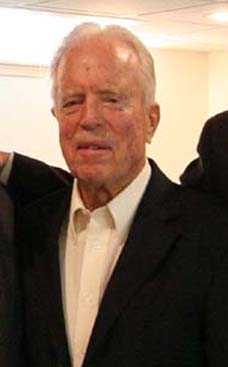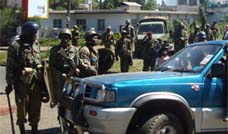
Over the next few weeks, I, too, assigned a few chapters from Genesis. On the first day we were to discuss them, I came in early to class and taped a big roll of cheap wallpaper, underside up, onto the tops of the long wooden tables, which I rearranged into a large U. I handed out colored pencils and crayons. Dividing the class into groups of three or four, I gave each group the task of drawing the stories consecutively, beginning with the Creation, and ending somewhere around the Flood. My students were astounded. "Do you think we are in gradinita (kindergarten), Mrs. Norris?" one young man asked huffily. Within five minutes, however, everyone, working both individually and cooperatively, had become wholly absorbed in producing amazing visual interpretations of "their" section. I asked each group to tell the story of what they'd drawn, then asked them to retell another group's story, pausing to review unfamiliar vocabulary. I used this same technique next with Hamilton's Greek myths, and with memorable results both times. Reading, drawing, and retelling worked in tandem to create visual and oral support for a second reading, and for the following week's critical-thinking questions on creation narratives.
Lee Norris spent days thinking about how I could stimulate both critical thinking and imagination from students in Moldova who had known little but rote memorization questions from Soviet-approved writers
Bringing Barnard Into The Peace Corps:
In 1996, I finally made it into the Peace Corps. I was 61. Maybe because I'd been an editor (Peace Corps logic), I was assigned to Moldova's second-largest university to teach literature to upper-level English students preparing for teaching careers. I had a 40-year-old B.A. in English from Barnard, and I'd never taught anything in my life. For the required Soviet-holdover course known as "Analytical Reading" my department chair gave me carte blanche. "Anything you give them will be valuable," she told me magnanimously. What on earth could I give them?
I'll draw a veil over the first semester. But during the long winter break I spent days thinking about how I could stimulate both critical thinking and imagination from students who had known little but rote memorization questions from Soviet-approved writers. One morning I woke up with the sudden memory of my 1953 first year English course with Professor Barry Ulanov.
Professor Ulanov was dark, intense, a spellbinding lecturer—and a jazz critic on the side. Perhaps it was his approach, but two of this teacher's most memorable reading assignments were Edith Hamilton's Mythology and Genesis. I remembered my shock at being introduced to the bible as literature and the unexpected scholarly, perceptive treatment of Greek myths. I knew I could never hope to achieve Ulanov's charisma, but perhaps I could recreate some of the surprise and interest I'd experienced in these same texts. To say that my adaptation of the material diverged from Professor Ulanov's approach is putting it mildly. But in the Peace Corps you learn to plunge ahead and just do something.
Over the next few weeks, I, too, assigned a few chapters from Genesis. On the first day we were to discuss them, I came in early to class and taped a big roll of cheap wallpaper, underside up, onto the tops of the long wooden tables, which I rearranged into a large U. I handed out colored pencils and crayons. Dividing the class into groups of three or four, I gave each group the task of drawing the stories consecutively, beginning with the Creation, and ending somewhere around the Flood. My students were astounded. "Do you think we are in gradinita (kindergarten), Mrs. Norris?" one young man asked huffily.
Within five minutes, however, everyone, working both individually and cooperatively, had become wholly absorbed in producing amazing visual interpretations of "their" section. I asked each group to tell the story of what they'd drawn, then asked them to retell another group's story, pausing to review unfamiliar vocabulary. I used this same technique next with Hamilton's Greek myths, and with memorable results both times. Reading, drawing, and retelling worked in tandem to create visual and oral support for a second reading, and for the following week's critical-thinking questions on creation narratives.
For our first short paper, back in 1953, Professor Ulanov had asked us to compare Alfred North Whitehead's The Aims of Education to Hamilton's Mythology. The memory of that paper gave me the impetus for my Genesis/Greek myths exam. My instructions: Compare the character and personality of God as described in Genesis with the character and personalities of both Zeus and Prometheus in the Edith Hamilton stories. "Support your comparisons with specific examples from the two texts," I added. This was a new concept. Even so, my students told me afterward that although the hardest, it was the most interesting exam they'd ever taken.
It may not have been American college-level work, but it worked in Moldova, and I like to think Professor Ulanov would have been pleased.
Lee Haas Norris (Cornelia Grunge ‘57) is a free-lance writer in Portland, Oregon.
Barry Ulanov was the McIntosh Professor of English at Barnard College for more than three decades. An author, editor, and translator of close to 50 books and more than 1,000 magazine articles on an a wide range of topic — from jazz to theater, Christian humanism to French — he was a spokesman for New York City's arts and cultural scene. He passed away in May, 2000, at the age of 82.










